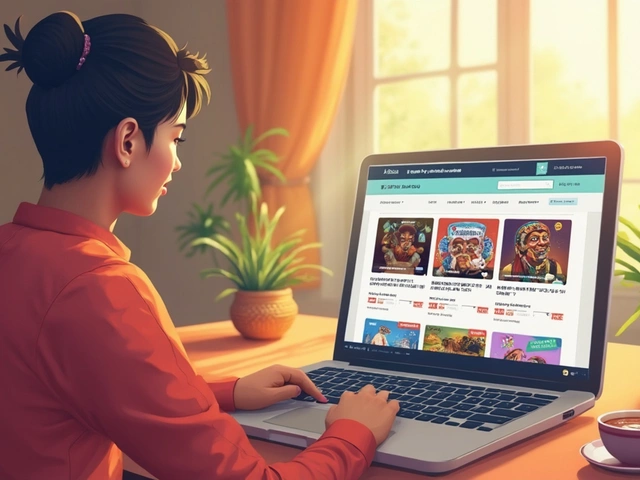
Top Free Blogging Platforms for Beginners in 2024
Free blogging platforms have made it easier than ever for beginners to dive into the world of blogs. Whether you want to share your thoughts, showcase your hobbies, or start a side hustle, there's a platform out there that fits your needs.
Choosing the right platform can be overwhelming with so many options available, each offering unique features and benefits. This guide aims to simplify that choice by reviewing some of the most popular free blogging platforms available today, helping you find one that perfectly suits your needs.
- Understanding Blogging Platforms
- WordPress.com
- Blogger
- Medium
- Wix
- Choosing the Right Platform for You
Understanding Blogging Platforms
In the digital landscape of 2024, the concept of free blogging platforms is not just a tool reserved for tech-savvy individuals but an accessible gateway for anyone with a story to tell. These platforms serve as the foundation on which dreams of sharing experiences, ideas, and creativity are built. But why have these platforms become so essential? It begins with their ability to democratize content creation. By providing user-friendly interfaces and eliminating technical barriers, they empower newcomers to craft and publish content with ease, making the once-daunting world of web presence approachable.
When delving into the features of these platforms, several common elements become apparent. They offer templates that simplify the design process, requiring no coding skills, allowing individuals to focus on the content. Most platforms also include integrated social media sharing, letting users broadcast their works seamlessly across their networks. Some services even provide insightful analytics, enabling bloggers to understand their audience better and tailor their content accordingly. As a beginner, focusing on the core strengths of your chosen platform—be it ease of use, customization options, or community support—is crucial in ensuring a successful blogging adventure.
Not all blog sites are the same, and understanding the distinct features each brings can be a game-changer. For instance, WordPress.com is renowned for its flexibility and expansive library of themes and plugins, while Blogger, powered by Google, offers seamless integration with other Google services, lending a sense of familiarity and ease of use. Medium, on the other hand, focuses on content-centric designs and highlights excellent writing rather than flashy graphics, nurturing a vibrant community of thought leaders.
“The beauty of blogging platforms is that they let the world see through your eyes,” notes a seasoned tech editor, emphasizing the personalized touch these tools offer.
As the options for starting your blogging journey widen, the challenge lies in selecting the platform that best aligns with your objectives. Makerspaces such as Wix are celebrated for their drag-and-drop simplicity, perfect for those who prefer a more visual approach to website creation. Meanwhile, each of these platforms continually evolves, offering new features and tools designed to captivate audiences and enhance the user experience. Whether your goal is personal expression or business development, the secret lies in harnessing the right platform to bring your vision to life.
In deciding which platform to start with, consider your blog's purpose first: Are you writing diary-style posts for a small group of acquaintances or aiming to build a wide-reaching influence? Understanding these needs will guide you to the perfect match and ensure that your blogging journey begins on solid footing. Remember, the world of beginner blogs is rich with opportunities, and the right platform can act as your very own megaphone to the digital world, unlocking endless possibilities.
WordPress.com
Among the vast array of free blogging platforms, WordPress.com stands out as a time-tested option for beginners. Initially released in 2005, it has had ample time to evolve and adapt to the needs of writers worldwide. One of its biggest appeals is its user-friendly interface that suits beginners who want to delve into start blogging without getting tangled in technical details.
WordPress.com allows users to create blogs using a basic free plan that offers numerous features. You don't need to worry about hosting or maintenance because that's all taken care of. The platform provides a variety of customizable themes, giving you the freedom to shape the look and feel of your blog. Many of these are pre-designed for various types of content, making it easier for you to start writing right away. If you're hesitant about the limits of the free plan, know that it indeed comes with a WordPress subdomain, which might be seen as less professional by some, but it's an excellent stepping stone to learn the ropes.
Accessibility and community support are two strong points for WordPress.com. Since it's such a widely used platform, there's an abundance of forums, tutorials, and user-generated content to help guide you through any struggles you may face. This communal knowledge pool is particularly comforting for beginner blogs trying to figure out the ins and outs of setting up an online presence. Users often find that questions posted in these forums receive responses quickly, aiding in smooth problem solving.
While the free version supports basic needs, WordPress.com does introduce limitations, such as inconvenient ads and restricted layouts. However, the opportunity to upgrade to a premium package is available if your blog requirements expand in the future. For beginners, though, knowing that you have room to grow on this platform is a serious asset. Matt Mullenweg, the founder, was quoted saying, "We wanted to democratize publishing so anyone with a computer could share their voice with the world," which precisely encapsulates the platform's mission to serve budding bloggers.
You'll find a variety of powerful tools integrated within WordPress.com's ecosystem. Whether you're looking to write long-form content, embed multimedia elements, or engage with a global audience through plugins and widgets, the platform supports it all. It's this completeness that leads many to consider WordPress.com as a staple choice when initiating a blog. As you familiarize yourself with its features and flexibility, it becomes evident why it's hailed as one of the best options out there. If you have ambitions to take your blog to a more sophisticated level, starting with WordPress.com is undeniably a wise choice.

Blogger
When considering free blogging platforms, Blogger often stands out as a popular choice, especially for those at the beginning of their blogging journey. Owned by Google since 2003, Blogger provides seamless integration with other Google services, which adds a layer of convenience for users already immersed in the Google ecosystem. By using Blogger, you can benefit from the trust and reliability that comes with a Google-backed service. Setting up a blog here is straightforward; you don’t need to be an IT wizard. It's designed to get you started quickly by prompting you through simple steps to create, customize, and publish your posts.
One of the biggest advantages of using Blogger is its simplicity. This platform is particularly well-suited for beginners because it strikes a balance between ease-of-use and functionality. You can access various built-in templates that let you customize your blog’s appearance, and while these might not offer the super-high level of customization you'd find in paid platforms, they work perfectly for newbies. Blogger allows users to monetize their site easily, especially since it offers smooth integration with Google AdSense. This feature can be a game-changer for those who are looking to earn some revenue from their blogging efforts.
"Blogger is a robust option if you're just starting out and need a streamlined way to share your stories online." - TechRadar
Unlike some other platforms, Blogger hosts your content on Google’s servers, which means you won’t have to worry about storage limitations or complicated hosting arrangements. Still, this can also mean you're limited by their rules and options. A downside for some might be the slightly dated look of some templates, though for others, that could evoke a sense of nostalgia, recalling the early days of blogging. In terms of SEO, Blogger handles the essentials fairly well. Each post is optimized for search engines to boost your site’s visibility, ensuring your blog can be found easily by readers interested in your subjects.
For those interested in extra features, Blogger also allows for community engagement through its comment section, though some users find third-party solutions more effective or flexible. It's worth noting its integration with Google Analytics offers insights into your blog traffic that help gauge the effectiveness of your content and marketing. Over the years, Blogger has retained a dedicated user base by its refreshing simplicity and unwavering stability, making it a safe bet for anyone looking to dip their toes into the world of blogging without financial commitment.
Medium
Medium is an increasingly popular choice among beginners entering the world of blogging. Launched in 2012, this platform has grown not only as a home for writers seeking a large audience but also as a community where engaging stories and insightful articles thrive. What truly sets Medium apart from other free blogging platforms is its primary focus on quality content and a built-in audience. Bloggers can benefit greatly from the exposure that Medium provides, as it already attracts millions of readers every month eager to consume new content.
The minimalist design of Medium prioritizes readability and simplicity, making it extremely user-friendly. You do not need technical skills to start writing or publishing your post on Medium. This aspect appeals to those who wish to concentrate purely on writing rather than customizing a blog layout or dealing with backend complexities. Moreover, by using Medium, you can enjoy versatile writing tools such as the ability to highlight text, easily embed media, and use interactive elements, all of which elevate your writing experience.
A unique feature of Medium is its Partner Program, allowing writers to potentially earn income based on the engagement their stories receive from Medium members. Thus, not only do writers get to explore and develop their blogs, but they also have the opportunity to gain tangible rewards for sharing their thoughts and expertise. While this program doesn't require any upfront fees, it exclusively focuses on members' reading time, which keeps the competition healthy and intense. Authors can gain followers and establish a presence through interaction with the Medium community.
There have been notable writers and publications that have chosen Medium as their preferred publishing avenue. Its algorithm-driven recommendations, based on what users read and appreciate, provide a democratic platform where content doesn't need forceful promotional tactics and can thrive organically. This sense of community and unbiased content delivery often gives Medium an edge in attracting diverse topics and audience niches.
"Medium is not about who you know, but the quality of what you’ve written." – Ev Williams, Co-founder of Medium
However, one should consider that, unlike dedicated personal blog sites, Medium focuses on growing its own brand over individual blogging brands. This approach may not suit bloggers wishing to establish their standalone online identity. Writers also should be aware that, while Medium doesn't provide customizable URLs or personal branding elements, their content's reach and visibility are enhanced as Medium is highly ranked in search engines.
In summary, Medium offers a straightforward and engaging platform for beginners keen on reaching a vast audience without needing extensive technical knowledge. Its community-driven environment makes it stand out among other beginner blogs options and establishes Medium as a great starting point for those wanting to make meaningful connections and share their story with the world.

Wix
Wix has gained popularity as a versatile website builder, and it's a fantastic choice for beginners looking to start their blogging journey. It offers a highly intuitive drag-and-drop interface, which means you don't need to have any prior coding knowledge to create a polished and professional-looking blog. This is appealing for many newcomers who might find the technical side of launching a blog daunting.
One of the standout features of Wix is the extensive range of templates it provides. Whether you're looking to create a personal blog, a site for your culinary exploits, or a more niche subject, Wix has a template to suit your needs. The templates are fully customizable, allowing you to tweak them to your liking. This flexibility sets it apart from other platforms that might restrict design modifications.
A key benefit of using Wix is its built-in SEO tools. These are designed to help newbies improve their blog's visibility in search engines without needing to delve deeply into the complexities of SEO. You can edit meta tags, optimize images, and even implement a structured data markup—all within the platform. Considering how vital SEO can be for attracting readers, this is an excellent feature for boosting your blog's appeal.
Another interesting aspect of Wix is its app market, which offers over 250 apps to enhance your blog's functionality. Whether you want to add comments, social media integration, or even an online store, these apps can extend your site beyond a simple blog. In an article by TechRadar, it's noted that "Wix's app market makes it one of the most adaptable platforms available, giving users the tools they need to customize their blogs to their specific needs."
For those interested in analytics, Wix provides robust tracking features. With Wix Analytics, you can track visitor statistics, which pages are popular, and where your visitors are coming from. This data is crucial for anyone serious about growing their blog and engaging with their audience. Moreover, Wix does not place ads on free websites if the user opts for a premium plan, allowing for an uninterrupted user experience and potentially better visitor retention.
While Wix offers a free plan, there are some limitations. The free plan includes Wix branding on your blog, and your domain will look like username.wixsite.com/blogname. For personal or professional branding, this might not be ideal. However, upgrading to one of their premium plans, starting at a reasonable price, can give you a custom domain and remove Wix ads. This upgrade provides a more seamless and professional appearance, which can be important as your blog grows and potentially monetizes.
Wix strikes a balance between user-friendliness and the ability to create complex, beautiful websites. This makes it an excellent platform for readers who are new to blogging but are keen to make something that stands out. It's the perfect tool for translating your passion into a readable, accessible, and visually pleasing format. With its helpful features and supportive community, Wix is a strong contender for anyone looking to dip their toes into the blogging world.
Choosing the Right Platform for You
Embarking on the blogging journey involves more than just laying down thoughts onto a digital page. It's crucial to select the perfect stage for your voice to be heard amidst the bustling online crowd. This decision can indeed seem daunting, akin to selecting the best city to settle down in. Each blogging platform comes with its bag of tricks and traits, catering to varied desires and technical comfort levels. At the heart of making this choice lies understanding what you want to achieve with your blog. Are you looking to make money? Share personal stories? Document a passion project? Identifying your blog's purpose will drive your platform choice, ensuring it meets both current needs and future aspirations.
Let's not forget the design aesthetics, which are often a dealbreaker for many when it comes to choosing their free blogging platform. Some beginners prefer the drag-and-drop flexibility of platforms like Wix, where creativity can flow freely like a painter on a blank canvas. Others might lean towards the structured, professional templates offered by WordPress.com, especially if they have a specific design in mind and want stability and tradition. Interestingly, a recent survey showed that 48% of bloggers prefer platforms that offer a mix of ease and customization, valuing creative freedom without compromising user experience.
Ease of use also plays a pivotal role in this decision. Many beginners find themselves at home with the straightforward simplicity of Blogger, which offers a seamless introduction into blogging without the intimidating bells and whistles of more complex platforms. Medium, on the other hand, attracts those with a knack for storytelling, where readership often trumps the need for customization. Elevating content above all, Medium offers a minimalistic interface that lets the words take center stage. A famous quote by Robert Scoble captures this sentiment exceptionally well: “Don't make users jump through hoops to get where they need to be. Give them what they want when they want it.”
Monetization options can be the deciding factor for those looking to eventually transition blogging from a hobby to an income stream. WordPress.com offers extensive options for those looking to capitalize on ads or e-commerce. Blogger also supports Google AdSense, making it relatively painless to incorporate advertisements once your blog gains traction. Concerning community and support, WordPress.com's extensive forums and tutorials are invaluable to newcomers navigating the learning curve. In contrast, platforms like Medium foster a strong reader-writer community due to their wide reach and simplicity, though they may offer less in terms of technical support compared to WordPress.
Budget-conscious aspirants will want to delve into the specifics of what these free blogging platforms entail. While most offer a free starting tier, evaluating what limitations come with these packages is crucial. Some platforms, like WordPress.com and Wix, might brandish your blog with their domain, which could distract from your personal branding. Custom domains and advanced features sometimes require paid upgrades, something to consider as your blog grows in scope and popularity. Therefore, weigh the pros and cons of sticking with a free plan versus investing in paid features that may enhance your blog’s functionality and appeal.
Equipped with this knowledge, choosing the right platform becomes less about technical jargon and more about aligning with your personal goals and style. From ease of creation and customization to community size and monetization, every element plays into creating a sustainable and enjoyable blogging experience. As one navigates through these choices, remember that the ultimate aim is to find a comfortable virtual home for your thoughts, where creativity and functionality coalesce harmoniously, helping your blog to flourish in the bustling online world.





Written by Arjun Mitra
I am an IT consultant with a keen interest in writing about the evolution of websites and blogs in India. My focus is on how digital spaces are reshaping content creation and consumption. I aim to provide insights and strategies for those looking to thrive in the digital landscape.
All posts: Arjun Mitra